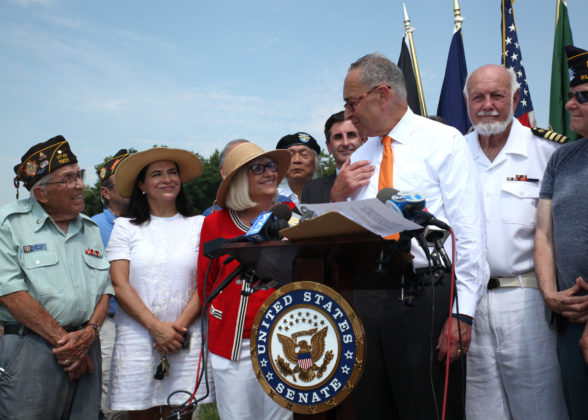Senate Majority Leader Chuck Schumer (D-NY) has called for the federal government to release $5 billion to aid mental health, a concern for millions of adults across the nation.
On Sunday, Schumer spoke on the mental toll that Americans face daily, a problem exacerbated by the restrictions caused by the coronavirus pandemic. Schumer said on average three times more people this year than last year reported they are struggling with depression, anxiety, drug use or more.
“What many New Yorkers are saying right now is that the pandemic has taken such a mental toll that some of them need more help than others to overcome new challenges and struggles related to their mental health and happiness,” Schumer said.
In the $5 billion request, $3 billion would come from mental health and substance use block grants Schumer helped secure. The grants would be used to fund treatment for New Yorkers, implement community-based mental health interventions and enhance efforts to prevent mental health problems.
More than $1 billion would be used to develop mobile crisis intervention services, which would work closely with law enforcement to help provide aid to people going through mental health or substance use emergencies.
The remaining funds would be used for mental health needs of frontline health care workers who have struggled with post traumatic stress disorder and fatigue throughout the pandemic, youth mental health, and other educational campaigns on mental health disorders.
“As a field, we are seeing surges in New York area patients with anxiety, depression and loneliness for adults and children,” Dr. Aspasia Hotzoglou, a licensed psychologist at the American Institute for Cognitive Therapy, said. “Some COVID-19 survivors are experiencing psychiatric symptoms for the first time months into their recovery.”
In March, the Long Island Network, which is made up of a dozen human service and behavioral health organizations, was awarded more than $5.7 million from a state grant to aid Long Islanders’ access to addiction prevention, treatment and recovery programs.
The funds, according to a news release, stem from the state’s federally backed Opioid Response Grant, which is administered by the state’s Office of Addiction Services and Supports.
“At a time when overdose fatalities are again on the rise and alcohol use is skyrocketing, we are thrilled to be part of this network, laser-focused on boosting efforts Island-wide,” Family & Children’s Association President and CEO Jeffrey L. Reynolds said. “Our unified, coordinated regional approach will harness the use of technology, evidence-based practices, and people with lived experience to increase access to services and care, especially for underserved communities.”
Reynolds’ organization is one of Long Island’s largest health and human organizations with 340 staff members, 200 volunteers and more than 30 programs that help the underserved and the at-risk populations.
The issue of mental health is one that the federal government needs to address, Reynolds said during a Blank Slate Media town hall event in March.
“One of the things we’ve come to understand is that, what we saw during [the pandemic], is a product of decades, in fact generations worth of neglect, chronic unemployment and chronic illiteracy,” Reynolds said. “When you look at the contrasting communities, Hempstead and Garden City, for example, and ask why is Hempstead that has exponentially higher numbers of deaths than Garden City, well I know why. Those disparities didn’t appear overnight and they won’t disappear overnight.”



